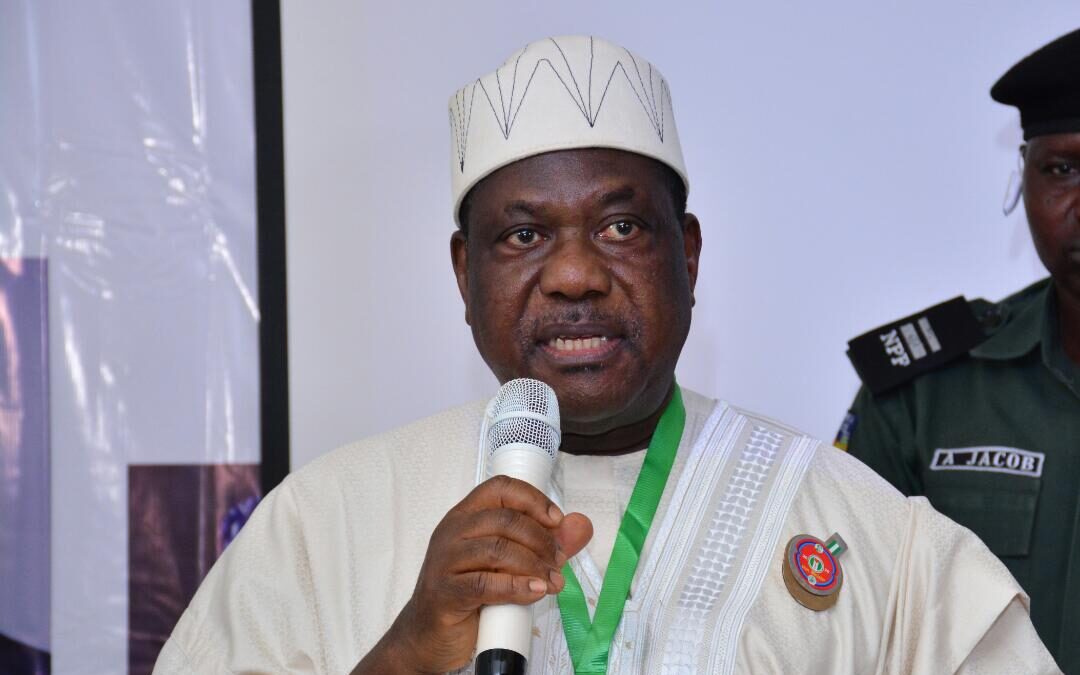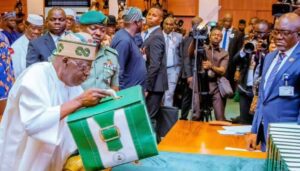


Economic reforms: Tinubu still in Nigerians’ goodwill, will be president till 2031 — SGF
…As Showunmi alleges lopsided appointment responsible for pushback against reforms
Secretary to the Government of the Federation ( SGF), Senator George Akume has stated that President Bola Ahmed Tinubu has not lost the goodwill of Nigerians noting that the President will occupy the highest seat till 2031.
The SGF made this known on Sunday during an interview on Politics on Sunday programme of TVC.
The SGF said despite theTax Reform Bills and other economic decisions taken within the last 17 months, the President still has the goodwill of Nigerians.
Highlighting the administration’s key economic policies, Akume said the removal of fuel subsidies and the harmonization of foreign exchange windows are key steps in stabilising the economy.
He expressed optimism that the results of these measures would soon be visible, restoring confidence in the nation’s economic trajectory.
“It is easy to destroy but difficult to build. These reforms aim to rebuild the Nigeria that was destroyed by previous administrations,” Akume remarked.
On the ongoing debate regarding the tax reform bill, Akume described the Tax Reform Bills as visionary legislation designed to rescue the nation’s economy, urging Nigerians to support their passage through the National Assembly.
“President Tinubu as a southerner, should be allowed to have a second term, meaning that those eyeing the presidency from the north in 2027, should look beyond that year by waiting till 2031.”
“If it is the will of God for Alhaji Atiku to be president of Nigeria, even at the age of 90 years, he can get it, but he and other northerners, eyeing the office now, should look beyond 2027,” he said.
Meanwhile, a Chieftain of the Peoples Democratic Party (PDP), Segun Sowunmi has alleged that the appointment of the finance minister, revenue boss, governor of the Central Bank of Nigeria (CBN) and tax reform chair all from the South has contributed to the pushback against the tax reform bills of the President by Northerners.
The PDP chieftain said that though the tax bills were good, the President created distrust among northerners by allegedly excluding their kinsmen from his economic and tax teams.
Sowunmi said, “They (Tinubu and his team) created it by themselves. You can’t have FIRS chairman Yoruba, finance (minister) Yoruba, Customs (boss) Yoruba, CBN (governor) Yoruba. You can’t do that. And then suddenly, the Yoruba people came and said we have a new tax regime. They (people of other tribes) will be nervous.
“People are not in the National Assembly or the Senate not to protect the interest of their people; that’s why they are there. They are representatives of their people. That’s why the push backs will come.”
He said there is no bill without grey areas but the Tinubu government “caused it by itself.”
“You may mean well but let me have some of my own seated at the table to be sure that you mean well. Nobody will sit at the table and cause injury to his tribe.
“I think the President needs to tell them in very clear language that I won’t be sitting here as president and refusing to do the right thing for the country only because you want to threaten me with elections. When we get to the bridge of election, we will cross it,” he added.
In a related development, the chairman of the Presidential Fiscal Policy and Tax Reform Committee, Taiwo Oyedele, has clarified that the recently proposed tax reform bills do not include any provision for an inheritance tax.
He made this disclosure via his X (formerly Twitter) handle, dispelling speculation about such a tax in Nigeria’s fiscal policy.
According to Oyedele, the inheritance tax was abolished in Nigeria in 1996 following the abrogation of the Capital Transfer Tax Decree.
He explained that inheritance represents a one-time transfer of wealth, either as a gift during the giver’s lifetime or upon their death, and differs fundamentally from recurring income subject to taxation under the proposed tax reforms.
“Inheritance tax is a one-time wealth transfer. Unlike inheritance tax, family income covered under the tax bills is expected to recur from time to time,” Oyedele stated.
He further highlighted the provisions of Section 4 of the Nigeria Tax Bill, which defines taxable income. Section 4(3), in particular, addresses taxable income earned by families, stressing that inheritance itself is not taxable under the bill. This approach aligns with existing tax laws, including Section 2(5) of the Personal Income Tax Act (LFN 2004 as amended).
Oyedele elaborated on the taxation of family income, noting that “In the case of income of a family recognised under any law or custom in Nigeria as family income, in which the several interests of individual members of the family are indeterminate or uncertain, tax may be imposed only by the territory in which the member of that family who customarily receives that income in the first instance in Nigeria usually resides.”
He also explained that individual earnings are subject to tax, and when groups such as partnerships, communities, or families earn taxable income collectively, they cannot claim exemption simply because they operate as a group.
“The income will therefore be taxed in the hands of individual members where their respective shares can be determined; otherwise, the group will be collectively taxed. This ensures equity and prevents a potential loophole in the tax law,” Oyedele said.
The clarification reinforces the government’s commitment to maintaining transparency and equity in Nigeria’s tax system, while also addressing misconceptions about the scope and implications of the proposed tax reforms.



